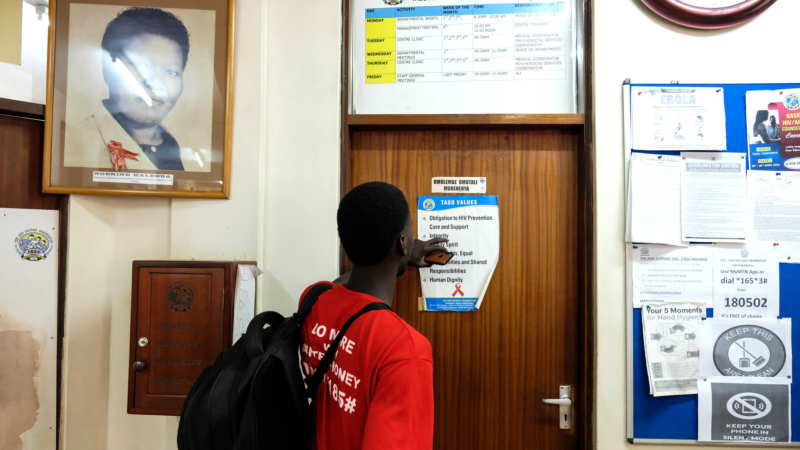A judge orders a temporary thaw to Trump’s foreign aid freeze. What will that mean?
On Thursday, a federal judge in Washington, D.C., ordered the Trump Administration to temporarily lift the freeze on all funding of USAID programs around the world — the United States Agency for International Development.
The lawsuit was brought by two health care organizations that get funding from USAID: Aids Vaccine Advocacy Coalition and Global Health Council.
Judge Amir Ali wrote in his order that Trump Administration officials “have not offered any explanation for why a blanket suspension of all congressionally appropriated foreign aid, which set off a shockwave and upended” contracts with thousands of nonprofit groups, businesses and others “was a rational precursor to reviewing programs.”
The order sets a Feb. 18 deadline for the administration to inform the court of “the status of their compliance.”
The State Department’s press office did not respond to a request for comment by press time.
For many in the international aid sector, the order is a crucial first step in the fight to retain global health and development support from the U.S. government. But how the funding will start flowing again is unclear.
“ This is a very important legal victory, but what it means for programs on the ground is confusing and problematic,” says Nina Schwalbe, who heads the global health think tank Spark Street Advisors.
In theory, the order to resume USAID funding is exactly what it sounds like, Schwalbe says. If implemented, anyone who received money from the agency before the suspension could presumably access those funds and continue their work for the duration of the Trump Administration’s 90-day review of USAID funding for foreign aid programs – which was announced on January 20 and will be in force until mid-April.
But this order is only temporary pending the findings of the program review. And unfreezing that money is not as easy as it sounds. In the wake of the Trump administration’s stop-work order, thousands of staff and contractors have been fired or let go from USAID and locked out of its computer systems. “So it’s hard to understand who’s going to actually turn the financing tap back on,” Schawlbe says.
Even if USAID funds were to flow again over the next few weeks, it will be difficult to restart projects that were shut down, says Asia Russell, executive director of Health GAP, an international organization that ensures access to life-saving treatment for people with HIV.
That includes HIV/AIDS programs supported by the U.S. program PEPFAR, like community drop-in health centers. Despite a waiver issued by the State Department on Feb. 1 allowing some treatments and testing to continue, many staff around the world “were required to fire staff, close operations, sell their equipment and step away from their life-saving work,” Russell says.
On a logistical level, it will take time for these projects to reopen, Schwalbe says. For starters, workers will need to be rehired.
It will also take an incredible amount of trust, says Diana Kearney, Oxfam America’s senior legal and shareholder advocacy adviser. It will be hard for grantees, partners and other aid groups to rely on the Trump administration to “actually give this aid out” in response to the judge’s ruling when “we have seen cases where they’ve just ignored temporary restraining orders.”
Migrants deported from U.S. to Salvadoran prison remain under U.S. control
The government of El Salvador has acknowledged to United Nations investigators that the Trump administration maintains control of the men who were deported from the U.S. to a Salvadoran prison.
DHS ends Temporary Protected Status for thousands from Nicaragua and Honduras
Some 76,000 people from Nicaragua and Honduras were covered by TPS, which provides protection from deportation and grants work permits to people from certain nations affected by war or natural disasters.
BRICS nations push back as Trump warns of tariffs
Leaders of the BRICS group of emerging economies meeting for their annual summit had hoped to downplay any differences with the U.S. But even a toned down group proclamation drew the ire of President Trump.
DOJ says no evidence Jeffrey Epstein had a ‘client list’ or blackmailed associates
The two-page memo outlines the "exhaustive review" the department conducted of the Epstein files in its possession, and also reiterates that Epstein died by suicide, contrary to some conspiracy theories.
Floods are getting more dangerous around the country, not just in Texas
The deadly floods in Central Texas were caused by extremely heavy rain. Climate change is causing even more rain to fall during the heaviest storms.
Near old Montana mine, special clinic for asbestos-related illness fights to survive
The Center for Asbestos Related Disease in Libby, Montana, closed in May after a court judgment. The clinic's federal funding is also threatened. Patients with scarred lungs worry about what's next.







